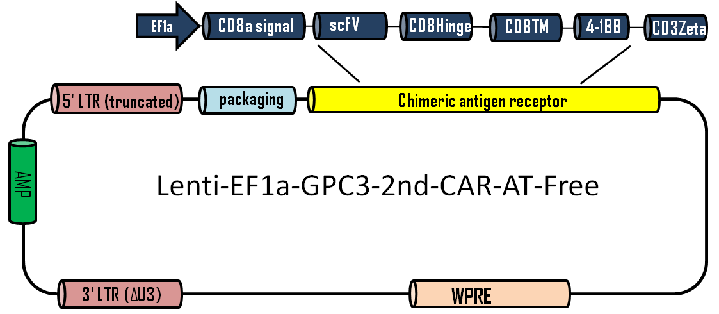Lenti-EF1a-GPC3-2nd-CAR-AT-Free
GPC3 is a member of the proteoglycan family. GPC3 encodes a GPC3 protein precursor containing 580 amino acid residues. Its core protein has a relative molecular weight of about 70 ku. It is rich in a unique sequence of 14 cysteine residues, with furin protease in the middle. Cut site. Furin protease cleaves Arg358 and Cys359 to form 40ku N-terminal subunit and 30ku C-terminal subunit. There is a signal peptide at the N-terminus, and the C-terminus is covalently anchored to the cell membrane with glycosylphosphatidylinositol. GPC3 plays an important role in regulating cell growth and differentiation, and is closely related to the occurrence and development of primary liver cancer. Studies have shown that GPC3 is highly expressed in HCC, but not or at low levels in normal adult tissues, suggesting that GPC3 may be an antigen associated with liver cancer cells and can be used as a potential target for targeted therapy. This product is a second-generation CAR lentiviral expression vector targeting GPC3 and can be used for preclinical related research.
Product name: Lenti-EF1a-GPC3-2nd-CAR-AT-Free
Promoter: EF1a [1]
Intracellular co-activation signal: 4- 1 BB /CD3Zata
Resistance gene: Amp
Tag: EGFRt [2]

Remarks:
1. Compared with the CMV promoter, EF1a can be continuously expressed in immune cells, so it can significantly extend the expression of CAR in T cells.
2. EGFRt intercepts domain III and domain IV of wild-type EGFR. This truncated EGFRt has no intracellular signal and will not transmit other signals to T cells . At the same time, these two domains are cetuximab Recognizing the epitope and expressing the epitope on T cells can not only be used as CAR-T screening markers, but also add a safety switch for clinical research. Related flow cytometry antibodies can be inquired ( iCareAb, CAT# IAB001A )

